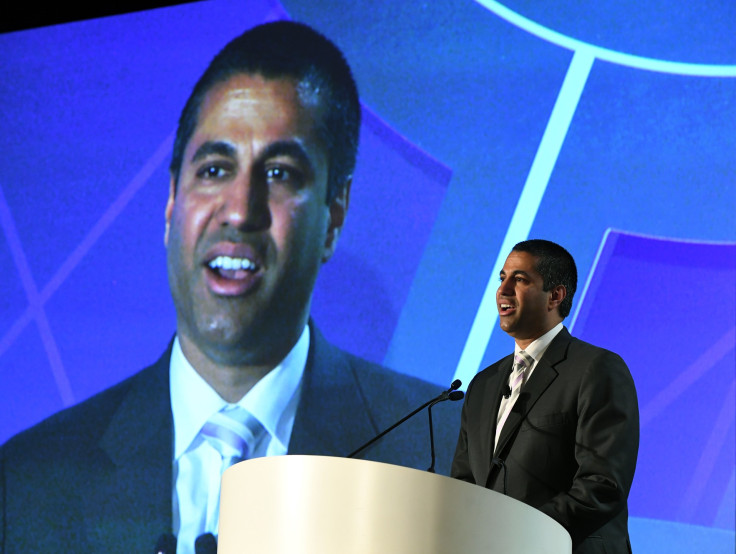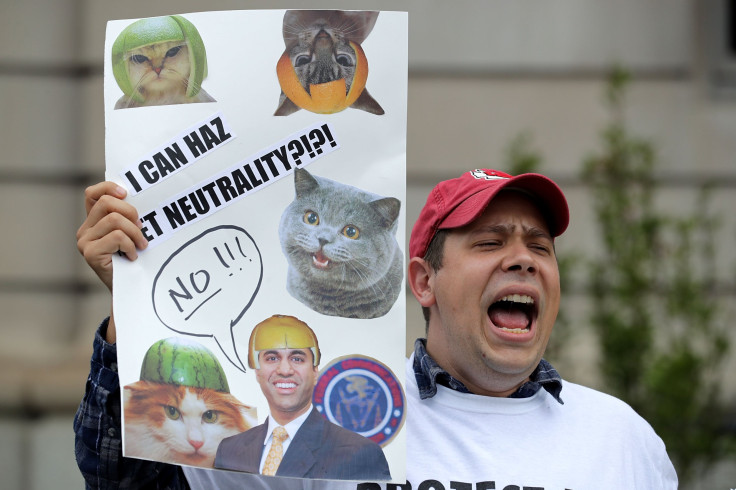Net Neutrality: AT&T Court Case Could Let Telecoms Slow Internet Speeds At Will

When the Trump administration proposed to repeal “net neutrality” rules, the initiative moved telecommunications companies one step closer to their goal of scrapping regulations that prevent them from preferencing internet content they like, and slowing down content they don’t. The initiative has drawn widespread condemnation, but it was not the only step in the industry’s battle to deregulate the internet: an imminent ruling in an obscure court case could end up leaving no federal or state agency with any right to police telecom companies’ treatment of millions of customers.
Without regulatory protections, consumer advocates warn, internet service providers like Comcast and Verizon could speed up, slow down, or block whichever content they choose for whatever reasons they choose — whether to charge money for fast lanes or to prevent users from accessing content critical of their political agenda. Despite those concerns, the Trump administration issued a headline-grabbing net neutrality proposal in April, led by FCC Chairman Ajit Pai, that would preempt states from regulating internet traffic, and officially terminate the Federal Communications Commission’s jurisdiction over internet service providers.
That move would return jurisdiction to the Federal Trade Commission, which has been seen as a weaker regulator because it cannot preemptively set rules but only take action after abuse harming consumers has occurred. Some conservative groups have nonetheless insisted that the FTC would be a robust watchdog, but an AT&T case moving forward in the U.S. Court of Appeals for the Ninth Circuit threatens to concurrently eliminate even the FTC’s comparatively weak right to regulate the internet.
Taken together, if the FCC does not delay its vote until the court rules, the net neutrality initiative and court ruling could end up creating a complete regulatory vacuum.
“It would become a total unregulated zone, really and truly,” said Harold Feld of the watchdog group Public Knowledge. “Because your only options for consumer protection are the FCC, the FTC or the states.”
After the FTC brought an enforcement action against AT&T, the communications giant argued that the FTC does not have jurisdiction over the matter because a different segment of AT&T’s business is also regulated by the FCC. That argument was, in effect, a new reading of the “common carrier” exception and the case (FTC vs AT&T Mobility) found its way to the Ninth Circuit, which sided with AT&T and undercut the FTC’s regulatory authority.

There is no built-in mechanism in the FCC’s net neutrality proposal to delay its implementation if the court undermines the FTC. The FCC did not respond to International Business Times questions about whether it would delay a vote on the proposal until the court rules, and whether consumers or telecommunications companies would be harmed by delaying the vote until after the Ninth Circuit’s decision has been resolved.
“What we have argued is that it would be wise to wait and see how the Ninth Circuit decision comes out,” said Feld. “Even if odds are good the FTC will win and AT&T will lose, the consequences of getting it wrong are catastrophic. If Ajit Pai really believes that the consumer protection afforded by the FTC is enough, then he should wait and delay the vote to make sure that the FTC’s regulatory authority is intact.”
The FCC is aware of the danger posed by the Ninth Circuit, as it is specifically mentioned in the draft net neutrality order circulated last week. However, the draft order dismisses the concern out of hand, stating simply: “we find objections based on FTC vs AT&T Mobility insufficient to warrant a different outcome.”
Meanwhile, as evidence of the impending regulatory vacuum, telecom giants have already begun citing the FCC’s preemption of state-level net neutrality rules in their legal arguments in state courts. Charter attempted to use the draft FCC order as legal ammunition in a lawsuit over deceptive advertising of slow internet speeds in New York.
In theory, FTC's regulatory authority could be salvaged through complex legal proceedings that involve the FCC forcing corporations to separate their common carrier and information services components into different subsidiaries. However, FCC officials have made it clear that they have neither the desire nor the capacity to pursue that avenue.
“AT&T’s argument that the FCC has the legal authority to require structural separation in order to facilitate FTC regulatory authority is baseless,” wrote Nicholas Degani, FCC’s acting general counsel, in a letter to the Ninth Circuit in October. “It would be unprecedented for the FCC to require separation simply to close a gap between FCC and FTC regulatory authority.”
Speaking more broadly about the prospect of FTC regulation of the Internet, FTC Commissioner Terrell McSweeny wrote on Twitter: “As I've said many times, the FTC doesn't have resources, expertise, or authority to ensure the Internet remains open.”
But if the FCC’s repeal of net neutrality rules goes through, the FTC may be all that internet users have to rely on to protect the open internet. And if the Ninth Circuit’s ruling stands, they may not even have that.
“The idea that the FTC will come to the rescue if Net Neutrality is destroyed at the FCC is a bad joke,” said Craig Aaron, president and CEO of Free Press. “The heads of the Trump FCC and FTC are defanging their own agencies, watchdogs which had just started to show some bite during the last years of the Obama administration. And that's exactly how AT&T wants them: toothless, tied up and with their tails between their legs.”
© Copyright IBTimes 2024. All rights reserved.











